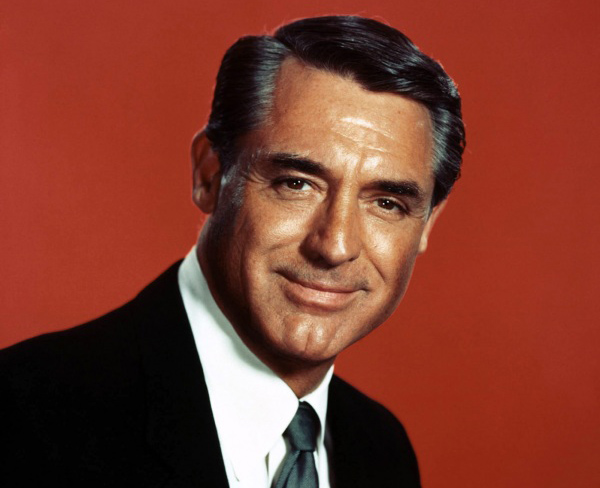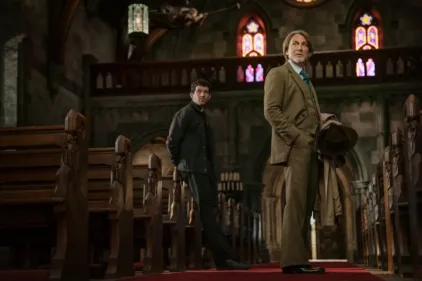Everyone knows that Cary Grant was the most charming man in the history of the movies, but charm alone did not make him a star, and indeed he rarely offered only charm in a performance. There was always something underneath, a quiet reserve, a certain coldness, a feeling that he was evaluating his leading ladies even as he romanced them – and that dual nature is what made him so important in so many different kinds of films. He brought comedy to thrillers, danger to romance, and even a certain poignancy to slapstick farce. He always gave us more than we bargained for.
Look, for example, at his famous kissing scene with Ingrid Bergman in Hitchcock’s “Notorious” (1946). In the movie, they are in love with each other, but Grant is a U.S. intelligence official trying to convince Bergman to marry Claude Rains, the leader of a postwar Nazi spy ring.Hitchcock’s shot begins on a balcony overlooking Rio. Grant begins to kiss Bergman, and as they stay in each other’s arms, they move slowly inside, where Grant picks up the telephone and makes a call, still holding her and kissing her, and then he guides them toward the door while she breathlessly makes dinner plans and he smiles rather remotely at her and then leaves, saying “goodbye” with an ironic smile before closing the door.
This is the kind of scene that perfectly captures what was unique about Cary Grant as a movie actor. He had the kind of handsome charm and sex appeal that made him completely convincing as a romantic leading man – but mere seduction never seemed very high on his list of priorities in the movies. He and his characters often had hidden agendas, secrets they were more interested in than love itself.
In “Notorious,” Grant cold-heartedly sends the woman he loves into a marriage with a Nazi – and then cuts off communication with her because he thinks she has turned into a drunken slut (actually, she is dazed because the Nazis are slipping arsenic into her coffee).
Another leading man might have wanted to appear in a better light, would have protested against such cruel behavior. But Grant seemed to welcome ambiguity; although he appeared in a lot of formula movies, he rarely played a formula character. Often he is effective in a movie just because he is playing against the other acting styles on the screen, keeping a poker face through a comedy and then dropping lighthearted wisecracks into a suspense picture.
Whatever and whoever he played, Cary Grant was almost always recognizable as himself in a movie; he didn’t go in for disguises and prop noses. That led some critics to assume that he was always playing himself. In a way, they were right; but what Grant himself tried to explain was that even “Cary Grant” was a role he was playing.
“I first created an image for myself on a screen, and then played it off-screen as well,” he once said, and in his 1983 book on the actor, Richard Schickel wrote: “The screen character he created starting some time in the mid-1930s drew on almost nothing from his autobiography, but was created almost entirely out of his fantasies of what he would like to have been from the start.”
The start, for Cary Grant, was a long way from what he became. Born Archibald Leach in 1904 in Bristol, England, he was the only child of a possessive mother and a withdrawn father. His parents were unhappily married, and the key psychological event in his life occurred when he was 9, and came home from school one day to find that his mother was no longer there. At first he was told she had gone on holiday, and then that she had gone somewhere on a long visit.
Only 20 years later did he learn that she had been committed to a mental institution, “by which time,” he once said, “my name was changed and I was a full-grown man living in America, known to most people of the world by sight and by name, yet not to my mother.”
Is it too much to assume that his childhood trauma, the unexplained departure of his mother, colored all of his thoughts toward women, and gave a deeper, even sinister dimension to his performances? He played opposite many of the greatest actresses of his age, from Mae West, who gave him his first starring role in “She Done Him Wrong” (1932) to Katherine Hepburn, who was his favorite partner in the 1930s, to Audrey Hepburn in “Charade” (1964), when he was deciding to retire from the movies.
The character he played in those movies was often much the same, and could be called “Cary Grant,” a name he made up himself – the first name from a role in a school play, the second from a list supplied by the studio. He was born into an English society which was much more class-conscious than it is now, and he was not born a “gentleman.” His father was part Jewish, a pants-presser for a garment manufacturer, and his mother came from modest origins as well. He was an ill-behaved schoolboy, ran away at 13 to become an acrobat, and worked his way up through vaudeville in England and America before emerging, in the 1930s, as the quintessential mid-Atlantic gentleman. It was a role he had learned to play, he sometimes suggested, by studying men he admired; eventually the role became so comfortable that he began to inhabit it off-screen as well, until he and the role became the same.
Because Grant was a definitive movie star, his actual acting ability was often overlooked. Yet in David Thomson’s respected Biographical Dictionary of Film, there is this flat statement: “He is the best and most important actor in the history of the cinema.” Thomson justifies this praise by pointing to Grant’s “unrivalled sense of timing, encouragement of fellow actors and the ability to cram words or expressions in gaps so small that most other actors would rest.” He had, Thomson adds, “a technical command that is so complete it is barely noticeable.”
That technical command is best seen in Grant’s comedies, where his timing was so perfect that other actors never seemed wittier than when they were in a scene with him. Look at Grant opposite Rosalind Russell in Howard Hawks’ “His Girl Friday” (1940), the remake of the classic Chicago newspaper comedy in which machine-gun dialog is rattled off nonstop for 90 minutes. Then look at him opposite Katharine Hepburn in Hawks’ “Bringing Up Baby” (1938), in which her dog steals his priceless dinosaur bone and gives it to her pet leopard – which Grant chases until he catches Hepburn, instead.
Both movies fall into the genre of screwball comedy, and might play on the same double bill, but notice how Grant modulates his performances, especially in the crucial scenes where he realizes that he may be falling in love. It is an actors’ truism that comedy is harder to play than tragedy, and perhaps no one in movie history could have played those two roles, and many others, better than Cary Grant.
He was also the perfect foil for Hitchcock in a movie like “North by Northwest” (1959), with its gloriously absurd plot. Here Grant’s ability to play against the material was crucial to the success of the movie. Hitchcock set out to place his hero in one fantastic location after another – Grant is almost shot in the United Nations, chased by an airplane in an open field, and ends up dangling from the faces of Mount Rushmore. A serious performance here would have been comical. A comic performance would have undermined the movie’s genuine suspense. Who but Grant could have found just the right note, halfway between drama and farce? The movie might not have worked at all, except in the way Hitchcock and Grant made it work, by marching straight ahead through the plot, refusing to acknowledge the abyss of self-satire that existed for both of them on either side of a very narrow line.
In real life, if such a term can be used about Cary Grant’s life, he was one of the few stars whose name could be shortened into one word, carygrant, and used as a shorthand incantation to represent a whole attitude about life. There are only a few such words made out of names, marilynmonroe, johnwayne, and for some moviegoers they represent a way of looking at things. “Who do you think you are,” people ask. “Cary Grant?” By which everyone knows exactly what they mean.
Grant himself seemed to know not only when to start playing the Cary Grant role, but when to stop. “Walk, Don’t Run” (1966) was not only the first film in which he did not get the girl, but also his last film. He announced his retirement, and stuck to it, so that we did not get the spectacle of Grant growing older and older in role after role, finally playing suicidal senior citizens in docudramas made for TV. He quit while he was ahead of the game, and his film image for generations to come will always show him at or near his best.
Grant did not, however, retire at the same time that he quit movie acting. He became an executive for Faberge, the cosmetics firm, and served on the boards of MGM and the Hollywood Park race track. He helped raise his 19-year-old daughter, Jennifer, from his fourth marriage, with actress Dyan Cannon. Grant and his fifth wife, Barbara Harris, were often seen at glittering social events in the Hollywood community, where Grant continued to prove Schickel’s contention that Grant and Fred Astai re were the only two men in the 20th century who seemed at home in top hat and tails.
Grant also took pride in his frequent public appearances around the country, where the format was always similar: He would show a reel of film clips from his favorite films, and then appear on stage with a chair and a glass of water, settle himself, and answer questions from the audience. He invariably refused press interviews in connection with these appearances, not unreasonably arguing that he should not give away in the afternoon what he was charging for in the evening. The performances were lucrative; in September, for example, he sold out the 1,920 seat Rialto Square theater in Joliet at $23 a ticket, and pocketed most of the take.
He died Saturday while preparing for another such appearance in Davenport, Iowa. He was by all accounts in chipper condition at the rehearsal, but then complained of feeling ill.
He refused at first to be taken to a hospital, however, arguing that he would recover in time for the evening performance; the old vaudeville training kept him a professional until the end.
The most famous of all Cary Grant stories is about the time a newsmagazine was preparing a story on him, and needed his correct age. The editors sent him a telegram: HOW OLD CARY GRANT? And he wired back: OLD CARY GRANT FINE. HOW YOU?
Another story is told by his fellow Briton, Michael Caine. The two actors were standing in the lobby of the Beverly Wilshire Hotel, Caine remembers, when a stout lady came charging up and demanded Caine’s autograph, incredibly not recognizing Grant. After getting it, she said she had been waiting for three days in the hotel lobby, hoping to spot some movie stars. “I think it’s shocking that more stars don’t come by,” she said, and then turned to Grant: “Don’t you?” Caine recalls that Grant was speechless. For once, his timing had failed him.












